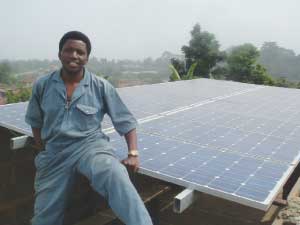Power Minister, Chinedu Nebo, has advocated that one of the easiest ways to get out of the predicament of unstable power supply is the use of solar energy which is expensive to install but costs less to maintain.

The beauty of it, he stressed, is that every part of Nigeria has solar radiation.
Nebo made the point during a visit to TheNiche office in Ikeja, Lagos, where he said through ‘Operation Light Up the Rural Area’, three communities have enjoyed one-year of uninterrupted power supplied via solar energy.
He also canvassed the use of ‘embedded’ power generation and distribution, which is far cheaper.
With embedded generation, he said, a community can be supplied with between 10 and 15 megawatts (mw) while the investor agrees a fee with the residents.
Nebo explained that any individual with the expertise and wherewithal is free to embark on such project.
His solar energy option comes at a time when most Nigerians are slammed with fraudulent bills by electricity distribution companies (Discos).
Such bills, which constitute a large hole in the pockets of consumers, some of whom live on monthly N18, 000 national minimum wage, must be eliminated.
Healthy financial habit implies that individuals make conscious effort to eliminate sources of financial drain. Every hole in the pocket plugged is additional naira saved for investment and creation of wealth.
Creation of wealth is one of the major ways an individual can increase his net worth. One may not achieve it except one eliminates unwholesome expenses, save money and invest in income yielding ventures.
Electricity consumers, particularly in Lagos, groan under widespread billing fraud that threatens to further emasculate living conditions. The consumers fail to realise that if they shun electricity supply and starve the firms of fund it will compel a drastic change.
Shittu Adeniyi is one of many who recently raised the alarm.
He wrote a petition to Eko Electricity Distribution Company (EKEDC) on October 17, 2014 alleging that his functional electricity meter was labelled ‘integrity doubtful’ by officials of Iba Business Unit, Ojo, who coerced him to pay N70,644 to purchase prepaid meters.
Ecobank payment receipt showed customer account number 2562128948 with payment made on July 1, 2014 for three units of single phase prepaid meters. He was told he would get the meters in 45 days.
Shittu said six months after the payment, even when his original functional meters were cleared from integrity doubts by engineers from Marina, Lagos is yet to get the prepaid meters.
“For how long will I be paying for what I did not consume, for God’s sake? You should always reckon how many hours of electricity supplied to me for use monthly, how many times in a month you supply electricity.
“Yet you keep billing me for what I did not use,” he stated in the petition.
Oluchi Cephas, who runs a provision store in a kiosk in front of his two bedroom apartment in Ipaye, Iba-Tedo, in Ojo, Lagos wrote his own petition to the National Electricity Regulatory Commission (NERC).
He complained that his electricity bill overshot the cost of his monthly house rent, implying that if he pays house rent and electricity bill, he will be left with nothing to take care of his family.
From less than N3, 000 monthly bill, he wrote, EKEDC increased it repeatedly over time and rose to N9, 000 in October last year.
These a few of the numerous cases raising questions over the high cost of public utility in the country. It is high time Nigerians explored solar energy and shun generation companies (Gencos) and Discos.
With N120,000 one can install low capacity solar energy that can last about five years with minimal maintenance.
At an average cost of N2,000 per month in a five-year span, solar energy is cheaper, affordable, and more cost effective than electricity.
















